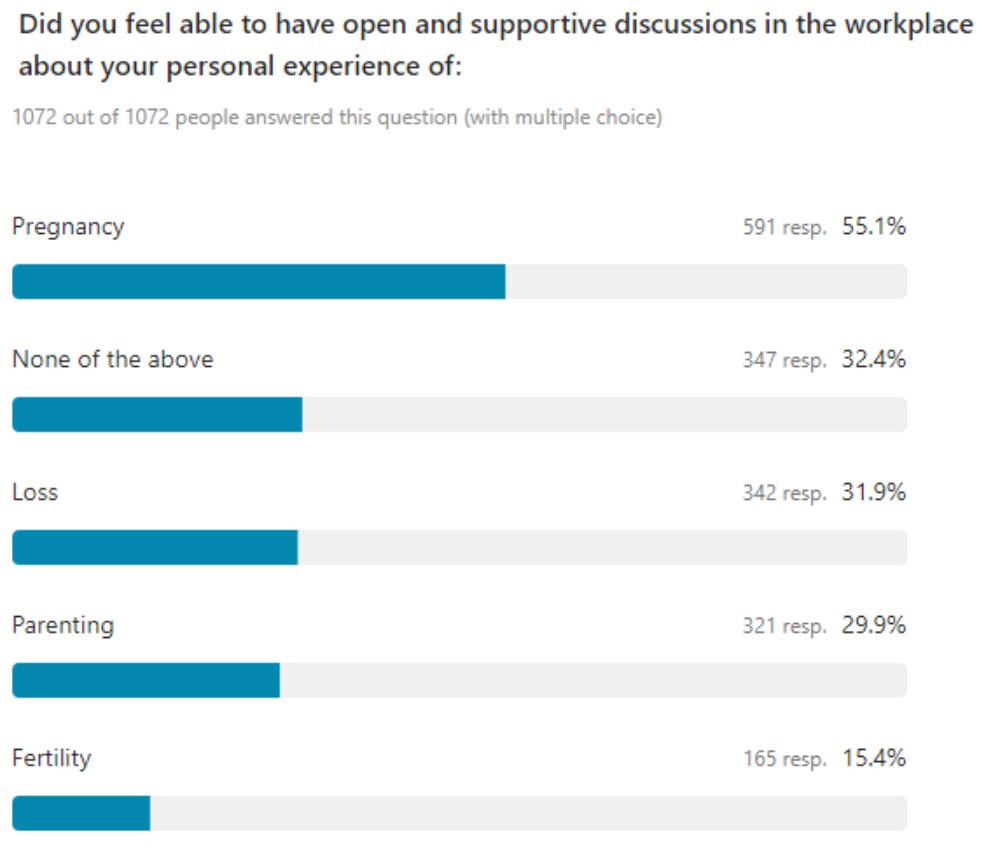
Research shows aspiring parents isolated by UK fertility taboo
Research shows aspiring parents isolated by UK fertility taboo
- 3.5 million Brits face infertility but support for its economic and emotional toll is limited
- Just 15% told colleagues they were having fertility treatment, with 3/5 going to work when they didn’t feel capable and 2/5 feeling unable to ask for help
- As politicians debate paid time off after pregnancy loss, Tommy’s campaigners say workplace support must include all those on complex journeys to parenthood
As the UK marks Fertility Awareness Week and Westminster debates paid leave for early pregnancy loss, Tommy’s charity campaigners are calling for wider changes to improve support for all those on complex journeys to parenthood - including the 1 in 6 couples* facing infertility.
New Tommy’s research** shows that most (55% of 1072 surveyed) parents felt able to talk openly at work about expecting a baby, but this dropped to just 15% for those going through fertility treatment – even lower than people who had lost babies (32%), suggesting a powerful taboo.
The vast majority (86%) said they had to put on a brave face at work while undergoing treatment, and most (62%) had worked when they didn’t really feel capable. Almost three-quarters (71%) felt unable to answer honestly if colleagues asked how they were, with many worried about being judged (57%) and feeling like they didn’t fit in at work anymore (43%).
 Civil servant Liz struggled to balance the demands of her job with treatment when undergoing several rounds of IVF last year. Liz said: “The internal turmoil is really intensified at work, because you want to be professional and worry that people won’t see you the same way if they know what’s going on, but it’s also really unhelpful to keep stress bottled up. I always felt guilty having to leave the office for IVF, because it’s not like other long-term health issues that you feel able to discuss openly; I worried about people judging me for taking calls or going to appointments when they didn’t know why.”
Civil servant Liz struggled to balance the demands of her job with treatment when undergoing several rounds of IVF last year. Liz said: “The internal turmoil is really intensified at work, because you want to be professional and worry that people won’t see you the same way if they know what’s going on, but it’s also really unhelpful to keep stress bottled up. I always felt guilty having to leave the office for IVF, because it’s not like other long-term health issues that you feel able to discuss openly; I worried about people judging me for taking calls or going to appointments when they didn’t know why.”
The physical and emotional challenges of fertility issues are intensified at work when presenteeism is valued; 80% of people undergoing treatment were stressed about how medical appointments would impact their work, and 74% felt like they were letting people down if they needed time off.
Roughly half (53%) of people going through fertility treatment weren’t sure what support they were entitled to at work, with many (42%) feeling they couldn’t even ask, while a quarter (24%) had sadly asked for help but not received it. Most (56%) said they would or have left a job over lack of support during this challenging time.
Employment lawyer Laura lost her first baby at 38 weeks pregnant and then had multiple miscarriages while going through fertility treatment. Laura said: “My managers were very understanding when I was having IVF and then going through pregnancies after baby loss - I was given every accommodation for practical things like medical appointments - but I still worried about it affecting my work as it took up so much mental space and energy. Talking about fertility treatment or pregnancy or baby loss isn’t always comfortable, but the effects of these experiences are long-lasting, and we need to make changes as a society to allow more honest conversations to happen.”
Although most (66%) people having fertility treatment felt their boss wanted to be supportive, far fewer (29%) said they actually knew how to help – which may explain why under half (47%) were open with their employer about how fertility problems might affect their work.
Tommy’s provides training for employers to help staff through common but complex issues like fertility treatment, pregnancy complications and baby loss. The charity is partnering with organisations across the country, from big companies like Santander to healthcare leaders like Birmingham Women’s & Children’s NHS FT, to improve workplace support throughout any pregnancy and parenting journey.
Tommy’s CEO Jane Brewin said: “The pregnancy journey can be a rocky road, and stigma in society often keeps us from discussing that. Up to 1 in 3 employees are pregnant or planning a pregnancy at any given time***, and not everyone is comfortable disclosing this at work, but the tendency to start families later in life means people are more likely to experience problems and may need support. As well as employers having formal processes in place to give staff the support they need during fertility treatment, we can all help tackle the taboo so that nobody has to struggle in silence.”
For more information visit tommys.org/work or search #WorkingForChange on social @tommys.
Cover Photo by Amanda Sixsmith on Unsplash














